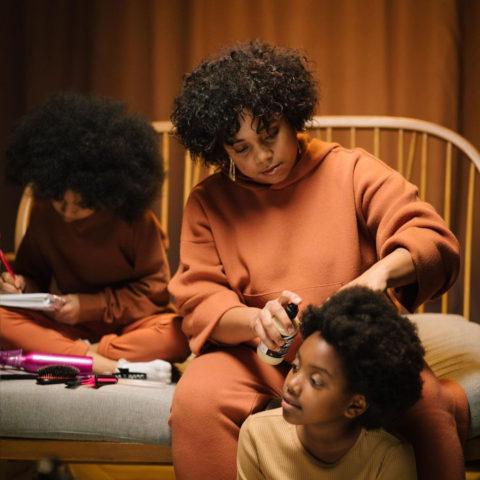This is Texture Talk, a weekly column that deep dives into the dynamic world of curly hair, from crowns of
Date December 4, 2020
When hairstylist Sarah Sango joined Lush’s UK-based Hair Lab, a testing ground for new haircare innovations and reformulations, as an R&D and Black haircare specialist two years ago, her personal mandate became to make sure her company had products that addressed the needs of type 3 (curly) and type 4 (coily) hair. “I just felt like with straight (type 1) and wavy (type 2) hair, there’s always going to be haircare available, whereas when you get into your 3s and 4s, you’re very restricted when it comes to mainstream products. You really have to search,” she says.
Once she was walked through Lush’s existing haircare range, Sango took the products home and put them to the test on herself and her children. “All my kids have a different curl texture and I have a different texture from them. By using those products in our hair, I was immediately able to identify the gaps and what was missing from the range.” The hairstylist of 19 years also did a product comparison against the existing go-to products in her hair arsenal that allowed her curls to thrive, as well as pulled inspiration from homemade haircare recipes. “Within the family, we use home recipes that involve a lot of butters, oils, essentials oils, avocado, egg — things that give our hair moisture and slip,” she shares.

When Sango got down to work with her team to better serve curls, she helped to craft conditioners that delivered more moisture and slip to the hair, update Lush’s classic co-wash bar by removing moisture-stripping sulfates, and formulate go-to stylers that bouncy texture would adore. The result: Lush’s 5-piece Twist and Curl range that officially dropped last month.
In terms of in-shower must-haves, you’ll find the revamped Avocado Co-Wash ($17), a creamy alternative to your standard shampoo; the repairing Power Conditioner ($13), which is more lightweight and made with biotin-packed sweet potato to strengthen dry, fragile hair; and finally Glory ($13), a deep conditioner packed with coconut cream, okra gel and olive oil. As for your stylers, which can all be layered together or used separately, there’s the Super Milk Conditioning Spray ($20), a leave-in conditioner that seals in moisture to freshly-washed hair; the shine-boosting Renee’s Hair Souffle Hair and Scalp Oil ($17) born out of Sango’s sister’s homemade hair treatment; and lastly Curl Power ($17), a hair cream that boosts definition.

With wash day being the foundation of a great curly-hair routine, especially after wearing a protective style for a good stretch of time, we asked Sango to dish on the go-to steps that she uses on her clients and herself for washing and detangling curls and coils. Read on for what the pro shared:
Setp 1: Try a pre-shampoo hot oil treatment on dry hair and finger detangle
“When wearing your hair out in an afro or in a protective style, you don’t have the opportunity to detangle and comb through your hair every day, so you can get an accumulation of new growth that sheds. Detangling before shampooing then becomes important so that your hair doesn’t matte and get more tangles. I like to melt down Lush’s Damaged Hot Oil Treatment until it’s quite runny and run that through the hair while finger detangling prior to applying any water or shampoo. The extra virgin olive oil in this hot oil treatment works really well to detangle curly and coily hair.”

Step 2: Give hair a thorough cleanse with a gentle, curly-friendly shampoo
“Shampoo the hair with a sulfate-free cleanser: something that still lathers up well and cleanses the hair, but doesn’t strip curls of their natural moisture. And make sure you’re getting right into the scalp to lift and remove any dead skin cells and product build-up. You can use a shampoo brush to help with this. They give the scalp a nice massage and promote blood circulation, which is good for hair growth and scalp health.”

Step 3: Lightly blot your hair dry before reaching for your conditioner
“I then rinse the hair and dry it off with either a T-shirt or a towel. I prefer to use T-shirts because the fibres are a lot gentler on curls. Once the water is mostly absorbed, I apply conditioner to damp hair all over, pulling it through from roots to ends to make sure the hair is fully saturated.”
Step 4: Detangle and twist hair in sections when laden with a slippery conditioner
“I randomly section off the hair with my fingers, and detangle each section with a wide-tooth comb or a detangling brush, like a Tangle Teezer, starting at the ends and working up to the roots, to work the conditioner through. As I’m finished with each section, I’ll twist it so that the hair isn’t losing any moisture. Your hair also gets a nice treatment as it sits in the twists. You can leave the conditioner in for like 20 minutes if you want so that it absorbs really nicely.”

Step 5: Rinse before reaching for your stylers
“Rinse out the conditioner, either with the twists in or unravel them for a more thorough rinse. Either way, at this point, your hair will be detangled and ready for styling. I think it’s really important that your cleansing and conditioning routine has that moisturizing slip because it really aids with styling, whether you’re going to blow it out, re-twist it or leave it out naturally.”

